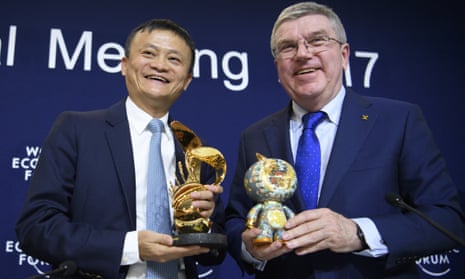When the Chinese businessman Jack Ma set up a fledgling e-commerce site in 1999 he called it Alibaba, drawing on the universal appeal of the One Thousand And One Nights character and his cry “Open Sesame”, which unlocked a cave containing vast treasures. It proved a prescient decision, as Alibaba become one of the world’s richest companies. On Thursday, in another sign of Chinese companies’ increasing willingness to flex their financial muscle and sign major global sporting deals, Ma was happily handing over millions of dollars after agreeing what he called a “historical” deal for Alibaba to be a leading sponsor of the summer and winter Olympics until 2028.
Under the terms of the deal, announced at the World Economic Forum in Davos, Alibaba joins McDonald’s, Coca-Cola and Visa on the International Olympic Committee’s highest level TOP partnership programme for the next six Games, as well becoming the IOC’s official Cloud Services and e-commerce platform services partner. It will also become a partner in the Olympic Channel, a digital TV service intended to promote the games to younger sports fans.
The IOC president, Thomas Bach, hailed the deal and said it showed the IOC was serious in trying to play more sport and “get the couch potatoes off the couch”. While neither the IOC nor Alibaba would comment on the sums involved, informed analysts told the Guardian that it could ultimately add over $1bn to the IOC’s coffers by the time it concludes in 11 years’ time.
Michael Payne, who was director of marketing and television for the IOC for 20 years and spent a year working with the IOC and Alibaba on the deal, said he believed that it was the most “groundbreaking strategic partnership that the IOC has yet entered into”.
“It is far more than a sponsorship,” he said. “It is getting into revolutionising the technology management in support of the Games, including the latest in digital technology and social engagement. It is about developing the Olympic Channel. And it is about getting into global e-commerce, and there probably isn’t a stronger company in the world as Alibaba in that space.
“This deal is not about sticking the Olympic rings on a product but a fundamental partnership for the future of the Games.”
The IOC marketing director Timo Lumme said that Alibaba could also be involved in other areas in the future, including ticketing. Lumme said that more than one company was involved in the tender process, but swiftly added that it was apparent Alibaba was “far and away the partner of choice due to the length and breadth of their commitment”.
It is only the second time that a Chinese company has been a top tier Olympic sponsor, following on from the computer firm Lenovo at the 2008 Beijing Games, although last year Dalian Wanda, led by China’s richest man Wang Jianlin, paid $1.2 billion for Infront, the company that sells broadcast rights for the next two World Cups.
Simon Chadwick, professor of sports enterprise at the University of Salford and an expert on China, said he believed that such deals were likely to become increasingly common given the growing emphasis on sport in the country – and its willingness to use soft power to exert political influence.
“Industrially and commercially, China wants to be the world’s biggest domestic sport economy by 2025 so this is another sign that it is seeking to grow in the sporting industry,” he said. “Arguably the most crucial thing about this latest deal is that it is another sign of its soft power – the Chinese are very good at using subtle power as a means of exerting political influence.”
“With the Winter Olympics in China in 2022 and other aspirations beyond that including a potential bid for the World Cup, these kind of sponsorship deals are a way of aligning with major governing bodies with a way of influencing their decisions.”
Over the past two years, Chinese companies have spent billions on sport – including buying up European football clubs and media rights agencies – after President Xi Jinping urged them to help transform China into a “great sports nation”. Alibaba also owns half of China’s most successful soccer club, Guangzhou Evergrande and has said it would spend $100m over 10 years in an effort to popularise rugby in China. In 2015, Wanda spent $52m for a 20% stake in Atlético Madrid.
In the past few weeks that spending has been ramped up to staggering levels, with the Chinese Super League club Shanghai SIPG signing the Brazilian Oscar from Chelsea for £52m – after agreeing to pay him £400,000 a week, and the Argentina striker Carlos Tevez agreeing a £615,000 a week contract after moving to China from Boca Juniors.
The Chinese government recently announced plans to cut down on excessive contracts, and Payne believes such issues will be overcome. “You are going to have the odd bump in the road, as one Chinese ownership either succeeds or fails, or there is a distorted amount of money put into the game. However I am sure that over time it will balance itself out. China is very much in this for the long term.”
